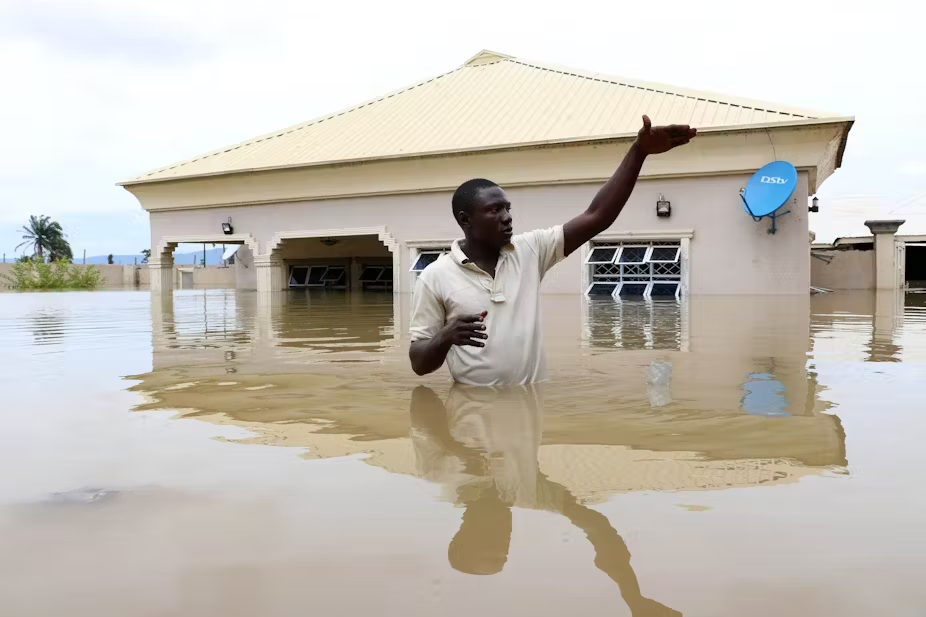Floods in Nigeria Devastate Lives and Farmland, Sparking Urgent Food Security Concerns
Abuja, Nigeria
Nigeria is grappling with a catastrophic flooding crisis that has claimed numerous lives, submerged homes, and obliterated farmland. The unprecedented scale of the disaster is raising urgent concerns about the country’s food security, economic stability, and overall well-being. As the situation continues to evolve, the full impact of these floods on Nigerian society and agriculture is becoming increasingly apparent.
The Extent of the Destruction
The floods, which began several weeks ago due to relentless heavy rainfall and overflow from major rivers, have wreaked havoc across multiple states in Nigeria. Regions including Kebbi, Niger, and Benue have been particularly affected, with waters inundating residential areas, agricultural fields, and critical infrastructure.
The immediate human toll has been significant, with confirmed reports indicating that at least 50 individuals have lost their lives. Rescue operations are underway, but the sheer scale of the disaster has overwhelmed local resources, leaving many areas still inaccessible. Authorities are conducting search and rescue missions, and relief teams are working tirelessly to provide aid to those in need.
In addition to the loss of life, the floods have caused widespread destruction of property. Homes have been swept away, schools have been damaged, and roads have become impassable. The loss of infrastructure not only disrupts daily life but also hampers rescue and relief efforts.
Impact on Agriculture
Agriculture, a vital component of Nigeria’s economy and a primary source of livelihood for many, has suffered severe damage. The destruction of farmland is particularly alarming given the country’s dependence on agriculture for both local food supply and economic stability.
Large areas of farmland have been submerged or washed away, destroying crops that were nearing harvest and severely impacting future planting. Key staple crops such as maize, rice, and sorghum have been lost, with reports indicating that entire fields have been rendered unusable. The flooding has also contaminated water sources, further complicating recovery efforts.
Farmers across the affected regions are facing an uncertain future. Many are left with no means to assess or salvage their damaged crops, and the destruction of farmland will likely have long-term implications for food production. The loss of agricultural output is expected to drive up food prices, exacerbate food insecurity, and affect the livelihoods of those dependent on farming.
Government and Humanitarian Response
In response to the crisis, the Nigerian government has mobilized resources and personnel to provide immediate assistance. The Ministry of Agriculture has issued a statement urging citizens to conserve food and prepare for potential shortages. Emergency relief operations are focused on providing shelter, food, and medical assistance to affected individuals.
Local and international humanitarian organizations are also actively involved in the response efforts. Aid agencies are working to deliver essential supplies, including food, clean water, and medical care, to communities in need. The government is coordinating with these organizations to ensure that relief reaches the most affected areas and that resources are allocated efficiently.
International support is being sought to bolster the response efforts. The Nigerian government has appealed for assistance from the global community, including financial aid, supplies, and technical expertise to support recovery and rebuilding efforts.
Food Security Concerns
The destruction of farmland and disruption of agricultural activities have raised significant concerns about food security in Nigeria. The country’s food supply chain is already under strain, and the floods are likely to exacerbate existing challenges. Food security experts warn that the loss of crops and farmland could lead to severe food shortages and increased prices in the coming months.
The Nigerian government and agricultural experts are closely monitoring the situation and assessing the potential impact on food availability and prices. Efforts are being made to identify alternative food sources and support farmers in rebuilding their livelihoods. However, the scale of the disaster means that addressing food security challenges will require a coordinated and sustained effort from all stakeholders.
Long-Term Implications
The long-term implications of the floods are still unfolding. Beyond the immediate humanitarian needs, there are concerns about the long-term economic and environmental impacts. The destruction of infrastructure and agricultural lands will have lasting effects on the country’s economic stability and food production capacity.
Rebuilding efforts will need to focus not only on restoring damaged infrastructure and farmland but also on enhancing resilience to future flooding events. This may involve investing in flood mitigation measures, improving agricultural practices, and strengthening disaster preparedness and response systems.
Community Resilience and Recovery
In the face of this disaster, Nigerian communities are demonstrating remarkable resilience and solidarity. Local organizations, volunteers, and community leaders are working together to support affected individuals and coordinate relief efforts. The spirit of cooperation and mutual aid is crucial in navigating the challenges posed by the floods and ensuring a successful recovery.
As recovery efforts continue, it is important for the government, humanitarian organizations, and the international community to work collaboratively to address both immediate needs and long-term recovery goals. Ensuring that affected communities have access to the resources and support they need will be key to rebuilding lives and restoring stability.
Moving Forward
The path to recovery from this devastating flooding crisis will be long and challenging. The immediate focus remains on providing aid and support to those impacted, while also preparing for the broader implications of the disaster. The combined efforts of national and international partners will be crucial in navigating this crisis and fostering resilience in the face of adversity.
The global community’s engagement and support will play a vital role in helping Nigeria overcome this disaster and rebuild for a more secure and stable future. As the nation moves forward, the collective determination and solidarity of its people will be essential in addressing the ongoing challenges and securing a brighter path ahead.





